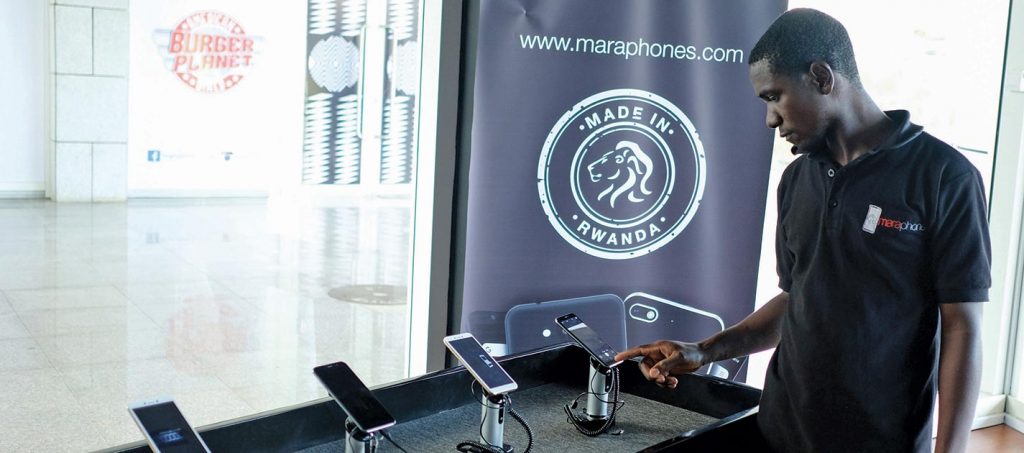More Africans are now using smartphones than ever, and 77% of them are under 35. Chinese companies control the African market and Transsion, a Shenzhen-based company, alone has almost a 50% market share. With Chinese prices so low, the African companies that are making their way onto the market are facing a tough time.
“I can’t imagine life without a smartphone,” says 35-year-old Lafu Balde. His daily life takes place on the streets of Bissau, the capital of the small Portuguese-speaking western African nation Guinea-Bissau, where he is always on the lookout for the odd job. Sometimes he offers to exchange foreign currency for foreign businessmen; at other times he runs errands for shopkeepers. “I use my smartphone to keep in touch with my customers here in Bissau, but also with my friends and acquaintances all over the world. For me, the smartphone is now almost as important as electricity, water or bread,” he said.

Many Africans, 77% of whom are under 35, now use smartphones. “For example, we use mobile phones for bank transfers. We buy digital credit and send it by SMS to relatives and business partners around the country. They can redeem the money anywhere,” says Lafu Balde. Nowadays it is possible to pay utility bills through the smartphone. Many universities offer online enrollment. Often, applications to administration offices and ministries can also be sent digitally.
The smartphone market in Africa is highly competitive, but few devices worldwide are designed with African customers in mind. This was something the Chinese company Transsion recognized early on and enabled it to become market leader on the continent over the last 10 years. According to Transsion Holdings, it has sold more than 130 million Tecno and Itel cells in Africa.
Designed to fit Africa
“They are exactly how smartphones need to be,” says Lafu Balde. He bought a Transsion phone recently: “It cost only 50,000 CFA francs [US$84] and has everything we need here in Africa: access to the most important social media is pre-installed, the device is robust and the battery lasts several days in standby mode. I am grateful to the Chinese for making it so easy for us to access the Internet.” Transsion phones also have user menus in several African languages and usually offer space for two SIM cards. That goes down well with the customers.

Chinese cell phones also dominate the market in Senegal and Nigeria, the latter being Africa’s most populous country. The same applies to the second largest market in sub- Saharan Africa, Ethiopia. Transsion was the first non-African company to introduce Amharic fonts and after-sales support in Amharic, almost 10 years ago.
Interestingly, only a few people in China are aware of the great success of Transsion mobile phones in Africa. The company achieved a market capitalization of around US$6 billion on the first day it went public, some few weeks ago.
The company’s focus on Africa began in in 2008, when Transsion defined its “Focus on Africa” strategy. It met with resounding success. In 2018, the volume of cells shipped from China to Sub-Saharan Africa reached 124 million. Last year, the company’s market share in Africa stood at almost 50%.
“Transsion’s strongest weapon is low prices,” Chinese IT expert Wang Ting said. The company carefully analyzed the needs of African users and geared its mobile phones accordingly. “For example, Transsion’s cameras recognize black faces in low contrast better than conventional cameras,” says Ting. Transsion is already firmly entrenched in the African market and continues to invest heavily in research and development. The Chinese company is making life difficult for African competitors.
Africa’s new competitor for China
A new African manufacturer, Mara Phone, is also trying to gain a foothold in the market. According to the Rwandan government, the company is backed by Ashish Thakkar, an investor from Dubai. Rwanda’s President Paul Kagame opened the first smartphone factory that produces directly in Africa in the capital, Kigali, at the start of October. A second one was inaugurated ten days later in Durban, South Africa.
Mara Phones are based on the Google operating system Android. Special features include the adaptation of social media presentations to the needs of African users. The company still plans to build around 1.2 million devices annually, which would make it a niche player. But things are about to change.
“High-tech for Africa from Africa is a project that the Rwandan government has actively supported from the outset,” says Clare Akamanzi, from the Rwandan state development agency RDB. “We’re excited about this project because it makes it easier for our people to access powerful smartphones.”
According to Akamanzi, currently only 13% of Rwandans own smartphones. “However, we want to push for major development in our country and promote the digital conversion,” Akamanzi said.
Rwanda is making great strides in terms of digitalization. Two years ago, the public administration put an Internet platform called Irembo (gate) online, through which all citizens can digitally access public services, including via smartphones. “We have placed all kinds of applications online, for example for ID cards. It is therefore very important for us that citizens have smartphones so that they can use our online service more easily,” says Akamanzi.
Interest in smartphones made in Africa is also growing in other countries. “I’ve heard about the new African cell phones from Kigali and I’m really curious when they will arrive here in Bissau. It makes me proud to know that there is a cell phone that is produced entirely in Africa,” says Lafu Balde. He adds that he would like to buy an African mobile phone provided the price/performance ratio is as good as that of the Chinese. But as far as he knows, the best priced Mara device costs €130 [US$143].
“Clearly too much,” Balde says. Like other African companies in the smartphone market, Mara would not be able to beat the low Chinese prices, and therein lies their hard struggle.